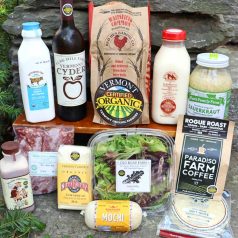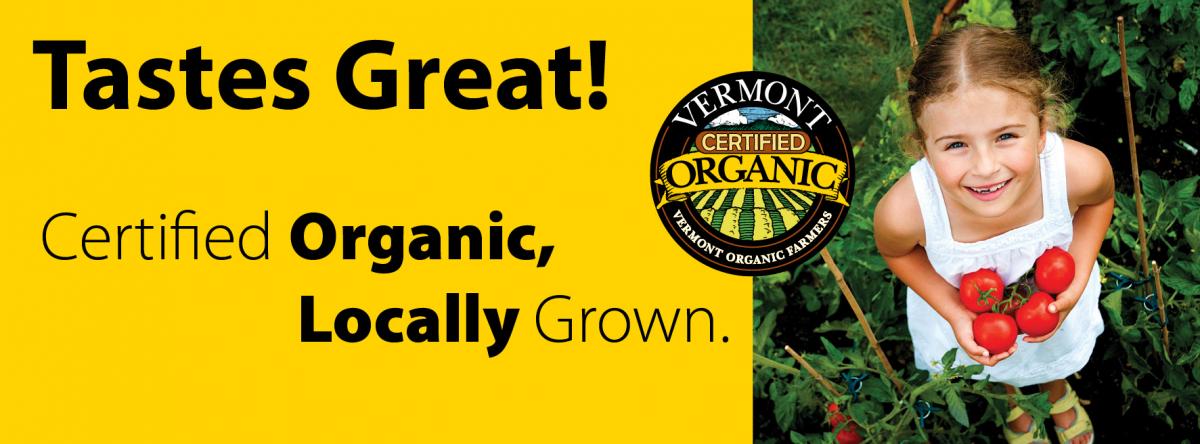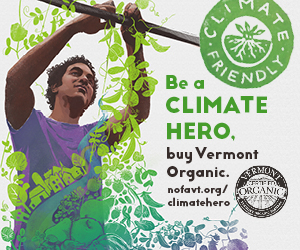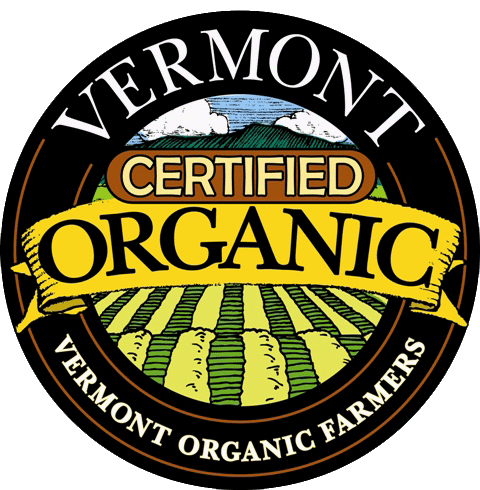
The Scoop on Vermont’s Organic Label
You’ve likely seen the logo on some of your favorite local products, but have you ever given much thought to the values behind Vermont’s organic certification label? Who is VOF? And what exactly does that label entail? We’re happy to peek behind that curtain and share what we’ve learned about the Vermont organic certification body known as VOF (Vermont Organic Farmers) and the standards that set their products apart.

Your choices make a difference! Nearly 800 Vermont farmers and processors that makeup Vermont Organic Farmers (VOF) know that local and organic always count. VOF believes that organic production enhances soil, plant, animal, and human health to protect the environment for current and future generations. Organic certification is needed to verify these production practices and to ensure that organic products are produced with integrity and transparency. VOF provides consumers with a process and a label they can trust. Seeing their label takes the guesswork out of your shopping experience, allowing you to feel confident that the products you’re purchasing are healthier for you and your family, supportive of your community, better for the land, and grown without GMOs or harmful agrochemicals.
ORGANIC FARMERS ARE CLIMATE FARMERS!
In the fight against climate change, efforts that strengthen natural resources, bolster the self-sufficiency of local communities, and improve resilience to the extreme and the unexpected are key. Long associated with environmental protection, the practices used on Vermont organic farms do just that. They lean on the right side of the scale, they contribute to the vitality and resilience of natural systems, anchor local economies, and can even mitigate the impacts of extreme weather events.

While organic practices may be known best for what they don’t do: namely, pollute airways, waterways, and soils with toxic fertilizers and pesticides, there’s just as much to be celebrated for what organic practices are actively doing to strengthen natural systems. In other words, while organic practices abstain from the bad, they also contribute to the good. It’s a double whammy in the fight against climate change, and a model for the kind of systems society will need in order to combat it.
While organic practices contribute to the reduction of climate change in many, many ways, we’ll focus on five of the heavy hitters here–you’ll notice some aren’t just focused on reducing climate change, but on building resilience to it as well:
- Organic practices protect natural resources. The stronger our natural resources are, the more capable they are of preventing, absorbing, and reconfiguring the effects of climate change, like a system of checks and balances, re-attuning to Earth’s happy homeostasis. Because organic practices steer clear of environmentally hazardous petrochemicals, our airways, waterways, and soils are that much less polluted. Our local flora and fauna are that much stronger, too. But organic practices like cover cropping, crop rotation, and integrated pest management go a step further to actively support air, water, and soil quality, as well as biodiversity. And of course, it’s all connected–the healthier the soil, the stronger the waterways; the stronger the biodiversity, the better the air quality; and so on. For Vermont organic farmers, the goal is to fuel this virtuous cycle: to strengthen our natural resources through our practices. And we know that, in the fight against climate change, those healthy natural resources are some of our best allies.
- Organically farmed soils release fewer greenhouse gasses. A healthy, vibrant soil ecosystem teems with life and decay. This rich food web produces nutrients that are readily bioavailable for farm crops, reducing their need for external fertilizers–some of which are major greenhouse gas contributors, both in their production and their application. Because organic farms abstain from using petrochemical fertilizers, they rely on biological soil processes more than their conventional counterparts. And as such, organic farmers really invest in our soils–from minimizing soil compaction to applying green manures, incorporating livestock, and maximizing soil cover, much of their work revolves around giving our soils their very best. Not to mention the fact that the healthier the soil is, the more capacity it has to actually sequester greenhouse gasses, but more on that later.
- Organic farms are more resilient to extreme weather events. One of climate change’s forecasts for Vermont is an increase in both the frequency and intensity of heavy rain events. For our local food system, that means on-farm flood mitigation measures are more crucial than ever because the more resilient a farm is to flooding, the more consistently it will be able to provide food for its community when transportation and communication are impacted. That farm’s mitigation measures will also result in fewer incidents of run-off and erosion, aiding our waterways when they’re stressed. Organic farmers’ soil-boosting, biodiversity-encouraging, water-conscious organic practices ensure we’re better equipped to stay afloat when waters are high.
- Organically farmed soils store carbon. The organic practices listed above all serve to improve our soil’s chemical composition and structure, facilitating the kind of vibrant soil ecosystem that draws carbon and other greenhouse gasses out of the atmosphere. This process, called sequestration, transforms hazardous greenhouse gasses into soil nutrients that allow for even healthier soils, which can then sequester more greenhouse gasses. Soil sequestration is one of the most cost-effective ways we can reduce our greenhouse gas emissions, and thus decelerate climate change.
- Organic farms are good for communities. In our globalized, industrial age, Vermont organic farms represent something different: a core component of localized food systems, localized communities, and localized economies. These more self-sufficient traits are key to climate resilience. The organic farming community is invested in community resilience, and also invested in providing healthy, toxin-free food for their communities–that’s what Vermont organic farmers do! They also support the notion that all Vermonters deserve nutritious, local, climate-friendly food, and are big proponents of NOFA-VT’s Community Food Access Programs, which subsidize CSA costs, facilitate SNAP-EBT sales at farmers’ markets and farm stands, and get Vermont organic food into senior housing facilities.
Environmental stewardship has always been baked into our Mission and ENDs at the Co-op, but now, in this era of climate change and consequences, we feel doubled down on this commitment. Supporting organic farmers is a way of fortifying a team of our best allies against accelerating greenhouse gas emissions, extreme weather events, and the destruction of natural resources. While human activity spurred this vicious cycle through the exploitation and abuse of natural resources, human activity can, and must, be responsible for spurring the corresponding virtuous cycles that will restore equilibrium and preserve this place we call home. Organic farming is one such virtuous cycle, and we’re proud to be fueling it here in Vermont.
How to Find VOF Certified Producers
VOF maintains a database of over 800 local organic producers to help you find certified organic farms/processors and their lists of products. You can search by product or by location. They also produce a Vermont Organic Farm and Food Guide annually, which can be accessed in print and digital versions. And when you’re shopping at the Co-op, just look for the VOF seal or pick up any local, organic produce, which is all certified by VOF!


